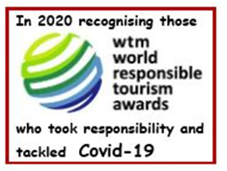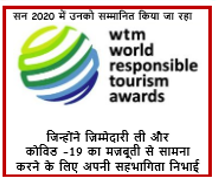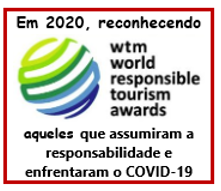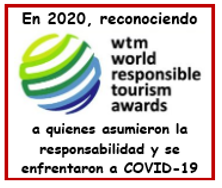As many of you will already be aware, we opened entries for the World Responsible Tourism Awards a couple of weeks ago. The aim of this year’s awards is to recognise those who have taken responsibility and addressed the challenge of COVID-19. It seemed inappropriate to carry on as usual, and the judges are looking forward to highlighting the businesses and destinations who have achieved incredible things during the crisis.




The ambition of the Awards has always been to recognise businesses and destinations which are making tourism better and to spread good practice – to educate, inspire and challenge others to do likewise or do more. World Responsible Tourism Awards winners are widely recognised by clients, partners, suppliers and local communities as businesses which contribute to local communities and the conservation of natural and cultural heritage.
Winning a World Responsible Tourism Award builds reputation, it makes business sense.
There are many ways in which the tourism sector is addressing the pandemic in destinations all around the world:
- Addressing the needs of neighbours and employees in the face of Covid-19 – finding ways of sustaining business to keep local people employed or using their facilities to help their neighbours cope with Covid-19
- Decarbonising travel and tourism- this remains a real priority for the sector
- Supporting wildlife and habitat in a year when tourism earnings for wildlife and conservation have been very substantially reduced
- Building or maintaining “meaningful connections” through Responsible Tourism value-led marketing and social media engagement
- Fundraising for people, wildlife or heritage
- Developing Domestic Tourism – looking for examples of businesses & destinations which have refocused on attracting a more local market, encouraging staycations or localisation (when safe to do so)
To give you a better idea of what we are looking for this year, I wanted to share some words from a couple of our previous winners:
Glynn O’Leary, Transfrontier Parks Destinations CEO: “Our business model is really about starting with the basics and working with people. A key component to what we do is creating rural employment. It’s really important that we create jobs and that the majority of them are filled by the local community.
“Rural tourism is always a challenging part of the tourism industry. For that reason, the exposure we get through the awards is fantastic. Now people are talking more about deep tourism, wilderness and learning about different cultures. These are things we have been doing for the past 15 years. Through the awards we are able to spread our message. The marketing aspect is valuable, but the awareness it creates is much more important.”
Richard Vigne, Ol Pejeta Conservancy CEO: “We started out as wildlife conservationists. We weren’t in the business of tourism to begin with, but it was a way to fund our conservation aspirations. That remains the case today. We run our tourism in a way that is completely compatible with the maintenance of conservation space.
“The awards send a signal to the industry that it is possible to run a responsible business that supports people and wildlife at the same time as making profit. We use it as a marketing tool, but also find it is something that is being sought after in the marketplace.”
Watch the videos within this post to hear Glynn O’Leary, Richard Vigne, Justin Francis, Responsibletravel.com CEO and I discuss why the awards matter.
Many local communities have been hard hit by COVID-19 and the absence of tourists which has destroyed many livelihoods. Let’s remember that tourism is a major funder of conservation in Africa and around the world.
As Justin Francis has argued there is far less welfare support for those who lose their livelihoods in developing countries, there are altruistic and self-interested reasons to act. “The developed north relies on many less developed countries to deliver travel ‘product’. Recovery here requires it there – we need to rebuild together.”
The Awards this year are different, we need to support wildlife and local communities. Don’t be reticent. Good practice must be recognised; the market is becoming more discerning.
Remember the judges can only recognise the destinations, businesses and other organisations or individuals that are nominated. Nominate yourself or others here
You may also be interested in…
You may also be interested in…
- Does the COVID-19 emergency mean over-tourism is over?
- How do we redesign tourism for a sustainable future?
- Will 2020 define the future of tourism?



Hi
How to apply for this award?
Please see final line of the blog post